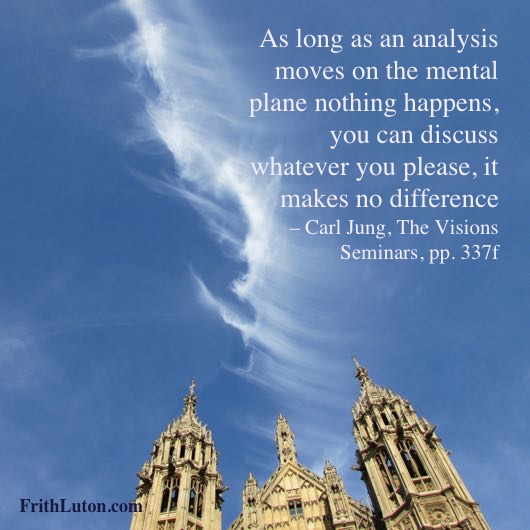As long as an analysis moves on the mental plane nothing happens, you can discuss whatever you please, it makes no difference, but when you strike against something below the surface, then a thought comes up in the form of an experience, and stands before you like an object. … Whenever you experience a thing that way, you know instantly that it is a fact. – Carl Jung, The Visions Seminars, pp. 337f

True healing does not happen in the head. It occurs through feeling-toned realisations in response to lived experience. That is why the analytic process, when pursued on an intellectual level—and that includes most self-analysis—is sterile.
Thoughts “in the form of an experience” have a transforming effect because they are numinous, overwhelming. They lead to a more balanced perspective: one is merely human—not entirely good (positive inflation), not entirely bad (negative inflation), but a homogenous amalgam of good and evil. The realisation and acceptance of this is a mark of the integrated personality.
The process of assimilating unconscious contents does not happen without work. It requires discipline and concentrated application, and a mind receptive to the numinous.
Jung purposely did not develop a systematic therapeutic method or technique, because he valued what happened in the individual encounter with patients above any theories on how things “should” proceed. He writes:
No programme can be formulated for the technical application of psychoanalysis. … My only working rule is to conduct the analysis as a perfectly ordinary, sensible conversation, and to avoid all appearance of medical magic.
… Any interference on the part of the analyst, with the object of forcing the analysis to follow a systematic course, is a gross mistake. … So-called chance is the law and order of psychoanalysis. – Carl Jung, “Some Crucial Points in Psychoanalysis,” Freud and Psychoanalysis, CW 4, pars. 624f
And this:
As far as possible I let pure experience decide the therapeutic aims. … The shoe that fits one person pinches another; there is no universal recipe for living. Each of us carries his own life-form within him—an irrational form which no other can outbid. – Carl Jung, “Problems of Modern Psychotherapy,” The Practice of Psychotherapy, CW 16, par. 81
However, Jung did describe four characteristic stages of the analytic process: confession, elucidation, education and transformation. (See: Carl Jung, “Problems of Modern Psychotherapy,” The Practice of Psychotherapy, CW 16 pars. 122ff.; see also Marie-Louise von Franz, C.G. Jung: His Myth in Our Time, pp. 66ff)
The ‘Four Stages’ of Analysis
In the first stage, you get things off your chest. Its prototype is the confessional practice of almost all the mystery religions of antiquity and their historical continuation in the Catholic Church. You confess to the analyst everything consciously concealed, repressed, guilt-laden, etc.—thoughts, wishes, fantasies, emotions like fear, hate, aggression and so on, and whatever else about yourself you are not proud of.
In the second stage, elucidation, you become aware of personal unconscious contents that have not been concealed or repressed but rather have never been conscious: dormant character traits, attitudes and abilities. You develop an understanding of complexes, projection, persona and shadow, anima/animus, and become aware of a regulating centre in yourself, the so-called Self. This comes about mainly through close attention to your responses to daily events and the nightly images in your dreams.
Once these contents have been assimilated to consciousness, the next task is that of education, which refers to discovering your role as a social being—your place in the world, where you fit in according to your talents and abilities. During this stage, it is not uncommon for one’s real vocation to become apparent, but surprise!—it may be something you hadn’t thought of before.
In the fourth stage, transformation, you become more fully the person you were always meant to be. Unconscious compulsion is replaced by conscious development; aimless activity gives way to a directed focus on what is personally relevant and meaningful. Ego-centricity is subsumed by a working relationship with the Self.
This process of maturation, although not the only possible sequence, is essentially what Jung meant by individuation. It takes time and effort and usually involves some sacrifice along the way, but it can happen.
© from Daryl Sharp’s Digesting Jung, reproduced with kind permission of the author.